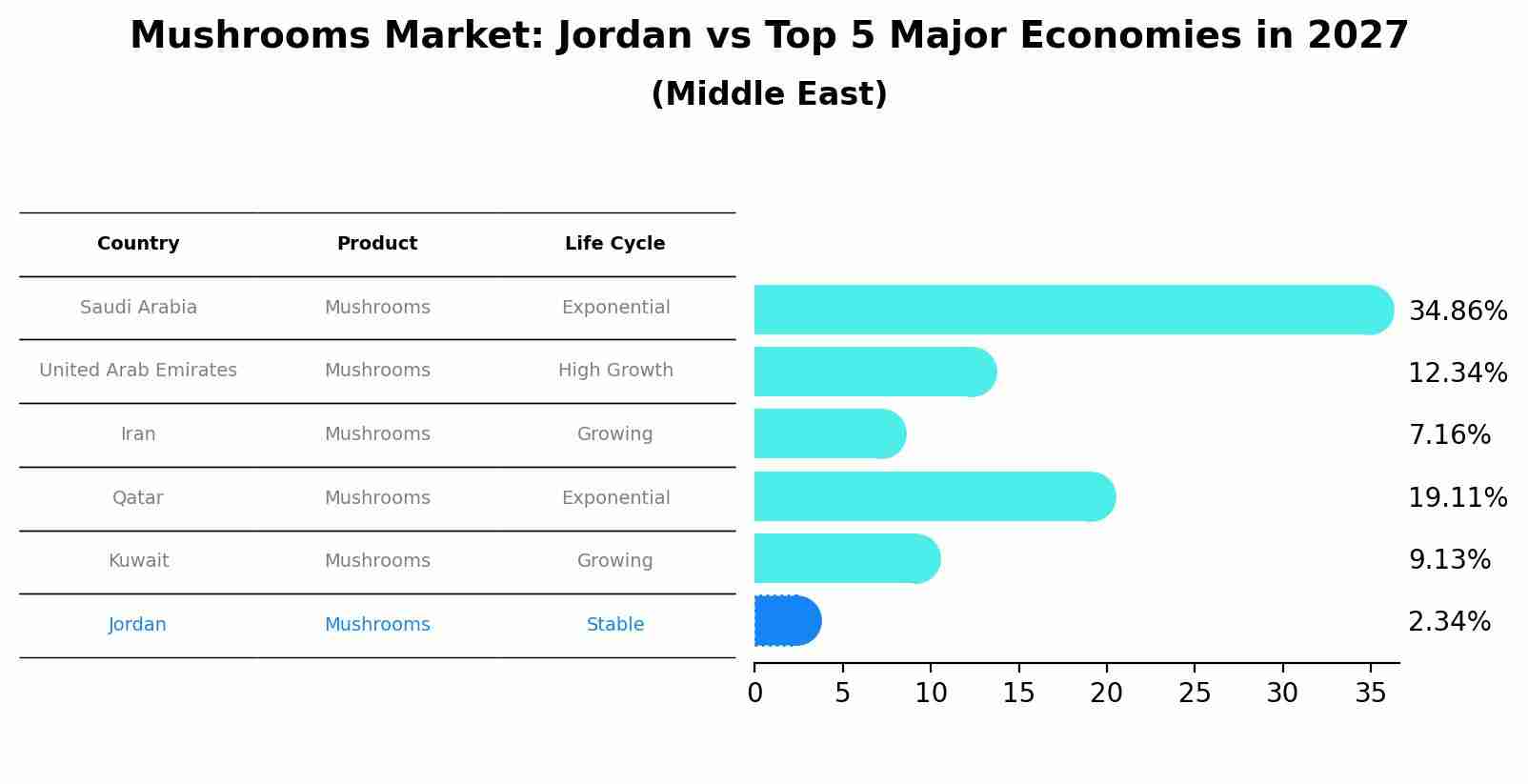Jordan Mushrooms Market (2025-2031) Outlook | Trends, Value, Size, Growth, Revenue, Industry, Analysis, Forecast, Share & Companies
| Product Code: ETC383206 | Publication Date: Aug 2022 | Updated Date: Jul 2025 | Product Type: Market Research Report | |
| Publisher: 6Wresearch | Author: Sachin Kumar Rai | No. of Pages: 75 | No. of Figures: 35 | No. of Tables: 20 |
Jordan Mushrooms Market Size Growth Rate
The Jordan Mushrooms Market is likely to experience consistent growth rate gains over the period 2025 to 2029. The growth rate starts at 2.22% in 2025 and reaches 3.09% by 2029.

Mushrooms Market: Jordan vs Top 5 Major Economies in 2027 (Middle East)
In the Middle East region, the Mushrooms market in Jordan is projected to expand at a stable growth rate of 2.34% by 2027. The largest economy is Saudi Arabia, followed by United Arab Emirates, Iran, Qatar and Kuwait.

Jordan Mushrooms Market Synopsis
The Jordan mushrooms market is a thriving sector characterized by a growing demand for fresh and locally sourced mushrooms. Mushrooms are a popular ingredient in Jordanian cuisine and are widely used in various dishes such as stews, salads, and appetizers. Oyster, button, and shiitake mushrooms are among the most commonly cultivated varieties in the country. The market is witnessing an increasing trend towards organic and specialty mushrooms, driven by health-conscious consumers and a rising interest in gourmet cooking. Local mushroom farms are expanding their production capacities to meet the escalating demand, while supermarkets and farmers` markets are key distribution channels for these products. Overall, the Jordan mushrooms market presents promising opportunities for both producers and retailers looking to capitalize on the growing consumer interest in fresh and high-quality mushrooms.
Jordan Mushrooms Market Trends
The Jordan mushrooms market is experiencing growth due to increasing consumer awareness of the health benefits and versatility of mushrooms. There is a rising demand for organic and specialty mushrooms, such as shiitake and oyster mushrooms, driven by the growing interest in plant-based diets and ethnic cuisines. Local producers are focusing on sustainable farming practices to meet the demand for high-quality mushrooms. The market is also seeing innovation in mushroom-based products, such as mushroom powders and supplements, catering to health-conscious consumers. Additionally, the trend of home gardening and DIY mushroom cultivation kits is gaining popularity among urban dwellers, contributing to the overall growth of the Jordan mushrooms market.
Jordan Mushrooms Market Challenges
In the Jordan mushrooms market, some of the key challenges include limited awareness and consumption of mushrooms among the general population due to cultural preferences and traditional dietary habits. Additionally, there may be issues related to inconsistent quality and supply chain management, as well as the impact of seasonal variations on production and pricing. Lack of proper infrastructure and technology for mushroom cultivation and storage could also hinder market growth. Furthermore, competition from imported mushrooms and other types of vegetables may pose a threat to local mushroom producers. Overall, addressing these challenges will require efforts to increase consumer education, enhance production practices, improve distribution networks, and promote the nutritional benefits of mushrooms to boost market demand and sustainability.
Jordan Mushrooms Market Investment Opportunities
One investment opportunity in the Jordan mushrooms market is the expansion of organic mushroom production. With a growing global trend towards organic and sustainable food products, there is a rising demand for organic mushrooms in Jordan and beyond. Investing in modern farming techniques, such as controlled environment agriculture, can help increase yields and produce high-quality organic mushrooms. Additionally, there is potential in developing value-added mushroom products, such as mushroom extracts or supplements, to cater to health-conscious consumers. Collaborating with local farmers to establish a reliable supply chain and distribution network can also be a lucrative investment strategy in the Jordan mushrooms market. Overall, tapping into the organic and value-added segments of the market presents promising opportunities for investors looking to capitalize on the growing demand for mushrooms.
Jordan Agar Market Government Policies
The Jordanian government has implemented several policies to support the mushrooms market in the country. These policies include providing financial incentives and subsidies to mushroom farmers to encourage production and export. Additionally, the government has established quality control standards and regulations to ensure the safety and quality of mushrooms produced in Jordan. There are also initiatives in place to promote research and development in the mushroom sector to enhance productivity and competitiveness. Overall, the government`s efforts are aimed at boosting the growth of the mushrooms market in Jordan and positioning the country as a key player in the regional and international mushroom trade.
Jordan Mushrooms Market Future Outlook
The future outlook for the Jordanian mushrooms market appears promising as demand for healthy and sustainable food options continues to rise. With increasing awareness about the nutritional benefits of mushrooms, coupled with a growing trend towards plant-based diets, the market is expected to witness steady growth. Jordan`s favorable climate conditions for mushroom cultivation, along with advancements in technology and farming practices, are likely to drive production efficiency and quality. Additionally, the rising interest in gourmet and exotic varieties of mushrooms among consumers presents opportunities for market expansion and product innovation. Overall, the Jordanian mushrooms market is poised for growth in the coming years, fueled by shifting consumer preferences towards healthier and environmentally friendly food choices.
Key Highlights of the Report:
- Jordan Mushrooms Market Outlook
- Market Size of Jordan Mushrooms Market, 2024
- Forecast of Jordan Mushrooms Market, 2031
- Historical Data and Forecast of Jordan Mushrooms Revenues & Volume for the Period 2021 - 2031
- Jordan Mushrooms Market Trend Evolution
- Jordan Mushrooms Market Drivers and Challenges
- Jordan Mushrooms Price Trends
- Jordan Mushrooms Porter's Five Forces
- Jordan Mushrooms Industry Life Cycle
- Historical Data and Forecast of Jordan Mushrooms Market Revenues & Volume By Product for the Period 2021 - 2031
- Historical Data and Forecast of Jordan Mushrooms Market Revenues & Volume By Button for the Period 2021 - 2031
- Historical Data and Forecast of Jordan Mushrooms Market Revenues & Volume By Shiitake for the Period 2021 - 2031
- Historical Data and Forecast of Jordan Mushrooms Market Revenues & Volume By Oyster for the Period 2021 - 2031
- Historical Data and Forecast of Jordan Mushrooms Market Revenues & Volume By Matsutake for the Period 2021 - 2031
- Historical Data and Forecast of Jordan Mushrooms Market Revenues & Volume By Truffles for the Period 2021 - 2031
- Historical Data and Forecast of Jordan Mushrooms Market Revenues & Volume By Other for the Period 2021 - 2031
- Historical Data and Forecast of Jordan Mushrooms Market Revenues & Volume By Form for the Period 2021 - 2031
- Historical Data and Forecast of Jordan Mushrooms Market Revenues & Volume By Fresh for the Period 2021 - 2031
- Historical Data and Forecast of Jordan Mushrooms Market Revenues & Volume By Processed for the Period 2021 - 2031
- Historical Data and Forecast of Jordan Mushrooms Market Revenues & Volume By Distribution Channel for the Period 2021 - 2031
- Historical Data and Forecast of Jordan Mushrooms Market Revenues & Volume By Direct to Customer for the Period 2021 - 2031
- Historical Data and Forecast of Jordan Mushrooms Market Revenues & Volume By Grocery Stores for the Period 2021 - 2031
- Historical Data and Forecast of Jordan Mushrooms Market Revenues & Volume By Supermarkets & Hypermarkets for the Period 2021 - 2031
- Historical Data and Forecast of Jordan Mushrooms Market Revenues & Volume By Convenience Stores for the Period 2021 - 2031
- Historical Data and Forecast of Jordan Mushrooms Market Revenues & Volume By Online Stores for the Period 2021 - 2031
- Historical Data and Forecast of Jordan Mushrooms Market Revenues & Volume By Application for the Period 2021 - 2031
- Historical Data and Forecast of Jordan Mushrooms Market Revenues & Volume By Food for the Period 2021 - 2031
- Historical Data and Forecast of Jordan Mushrooms Market Revenues & Volume By Pharmaceutical for the Period 2021 - 2031
- Historical Data and Forecast of Jordan Mushrooms Market Revenues & Volume By Cosmetics for the Period 2021 - 2031
- Jordan Mushrooms Import Export Trade Statistics
- Market Opportunity Assessment By Product
- Market Opportunity Assessment By Form
- Market Opportunity Assessment By Distribution Channel
- Market Opportunity Assessment By Application
- Jordan Mushrooms Top Companies Market Share
- Jordan Mushrooms Competitive Benchmarking By Technical and Operational Parameters
- Jordan Mushrooms Company Profiles
- Jordan Mushrooms Key Strategic Recommendations
Frequently Asked Questions About the Market Study (FAQs):
- Single User License$ 1,995
- Department License$ 2,400
- Site License$ 3,120
- Global License$ 3,795
Search
Thought Leadership and Analyst Meet
Our Clients
Related Reports
- Afghanistan Rocking Chairs And Adirondack Chairs Market (2026-2032) | Size & Revenue, Competitive Landscape, Share, Segmentation, Industry, Value, Outlook, Analysis, Trends, Growth, Forecast, Companies
- Afghanistan Apparel Market (2026-2032) | Growth, Outlook, Industry, Segmentation, Forecast, Size, Companies, Trends, Value, Share, Analysis & Revenue
- Canada Oil and Gas Market (2026-2032) | Share, Segmentation, Value, Industry, Trends, Forecast, Analysis, Size & Revenue, Growth, Competitive Landscape, Outlook, Companies
- Germany Breakfast Food Market (2026-2032) | Industry, Share, Growth, Size, Companies, Value, Analysis, Revenue, Trends, Forecast & Outlook
- Australia Briquette Market (2025-2031) | Growth, Size, Revenue, Forecast, Analysis, Trends, Value, Share, Industry & Companies
- Vietnam System Integrator Market (2025-2031) | Size, Companies, Analysis, Industry, Value, Forecast, Growth, Trends, Revenue & Share
- ASEAN and Thailand Brain Health Supplements Market (2025-2031) | Strategy, Consumer Insights, Analysis, Investment Trends, Opportunities, Growth, Size, Share, Industry, Revenue, Segments, Value, Segmentation, Supply, Forecast, Restraints, Outlook, Competition, Drivers, Trends, Demand, Pricing Analysis, Competitive, Strategic Insights, Companies, Challenges
- ASEAN Bearings Market (2025-2031) | Strategy, Consumer Insights, Analysis, Investment Trends, Opportunities, Growth, Size, Share, Industry, Revenue, Segments, Value, Segmentation, Supply, Forecast, Restraints, Outlook, Competition, Drivers, Trends, Demand, Pricing Analysis, Competitive, Strategic Insights, Companies, Challenges
- Europe Flooring Market (2025-2031) | Outlook, Share, Industry, Trends, Forecast, Companies, Revenue, Size, Analysis, Growth & Value
- Saudi Arabia Manlift Market (2025-2031) | Outlook, Size, Growth, Trends, Companies, Industry, Revenue, Value, Share, Forecast & Analysis
Industry Events and Analyst Meet
Whitepaper
- Middle East & Africa Commercial Security Market Click here to view more.
- Middle East & Africa Fire Safety Systems & Equipment Market Click here to view more.
- GCC Drone Market Click here to view more.
- Middle East Lighting Fixture Market Click here to view more.
- GCC Physical & Perimeter Security Market Click here to view more.
6WResearch In News
- Doha a strategic location for EV manufacturing hub: IPA Qatar
- Demand for luxury TVs surging in the GCC, says Samsung
- Empowering Growth: The Thriving Journey of Bangladesh’s Cable Industry
- Demand for luxury TVs surging in the GCC, says Samsung
- Video call with a traditional healer? Once unthinkable, it’s now common in South Africa
- Intelligent Buildings To Smooth GCC’s Path To Net Zero


















